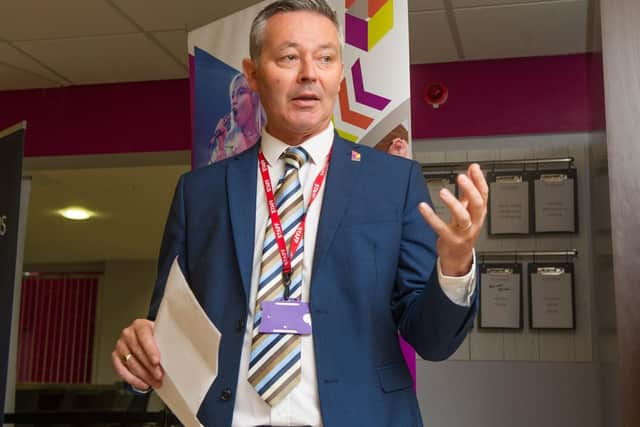What headteachers think - ‘New funding will only take us back to 2010 levels’


Headteacher at The Cowplain School, Ian Gates, said: We have experienced eight per cent real-terms cuts to per pupil funding and the proposed increase only takes us back to 2010 levels. Schools need this money now yet it will be phased in over three years just to get us back to the levels of almost a decade ago.’
One of the big concerns is that any new funding will be swallowed up by the additional burden of costs placed on schools.
Advertisement
Hide AdAdvertisement
Hide AdMr Gates added: ‘Schools have had to find £8bn from their budgets to fund additional pension costs along with rising national insurance contributions. Due to a 55 per cent reduction in local authority services schools are also having to pick up additional responsibilities such as mental health and social care. We also have around a third more pupils with Educational Health Care Plans with each one requiring partial funding by schools. I can see the money coming in and going straight back out again.’


It is a sentiment shared by Ian Potter, executive headteacher of the Gosport and Fareham Multi Academy Trust.
Mr Potter said: ‘School funding remains a challenge for school leaders and governors mainly because of increased costs. The shortfall in the local government pension scheme is being passed onto schools to meet and so this adds to the cost of employing support staff. This means that the impact of alleged changes to funding of schools too often feels like giving us back what has already been taken away through these expenditure rises.’
St Edmund’s Catholic School headteacher, Simon Graham, added: ‘The 2.75 per cent increase to teachers salaries was welcome but only 0.75 per cent came from central government with the remaining two per cent coming from school budgets. The cost of school equipment has also risen massively. In effect any money coming into schools will just about cover these additional costs.’
Advertisement
Hide AdAdvertisement
Hide AdHeadteachers have also cited the reduction of ‘capital funding’ and the abolition of the Building Schools for the Future Programme in placing an additional burden on schools who then have to find funding for school building improvements from per pupil budgets.
Speaking previously on the issue, executive headteacher at Trafalgar and Admiral Lord Nelson schools, Steve Labedz, said: ‘Whilst the government have stuck to their promise of not reducing core per pupil funding, what they have done is reduce everything else and scrapped half the additional grants that used to exist by which you could function.’
Headteachers feel that ultimately any additional funding will not go to those who stand to benefit most - the children.
Mr Graham said: ‘Unfortunately this money will be swallowed up by all these additional cost rather than supporting where it should be which is the children and their learning.Year on year class sizes go up and it’s becoming more difficult for schools to maintain the variety offered in their curriculum.’
Advertisement
Hide AdAdvertisement
Hide AdWhile the government have also allocated an additional £780m for children with special educational needs and disabilities (SEND), Mr Graham does not feel it goes far enough.
‘The maximum funding you will get for a child with SEND is around £10,000,’ he said. ‘If a child needs full-time support in lessons then the cost of employing a teaching assistant is double that. This additional money has to come out of the school’s main budget.’
For Portsmouth City Council’s cabinet member for education, Suzy Horton, the additional funding at least provides some welcome breathing space.
Cllr Horton said: ‘Due to the funding shortfall, schools and local authorities have been faced with making some unpalatable decisions. While this money won’t redress the long-term funding gap it at least gives schools a little more breathing space.’
Advertisement
Hide AdAdvertisement
Hide AdPetersfield headteacher and Worth Less Campaign lead for Hampshire Tony Markham feels the additional funding is a ‘step in the right direction’ but remains cautious about how it will be implemented.
Tony said: ‘From my experience the problem is that due to additional costs placed on schools the reality of commitments for additional funding rarely materialise as they are portrayed.’
Ian added: ‘We really need to see the colour of Mr Johnson's money with no further backdoor costs imposed on schools.’
POST-16
While additional funding has also been allocated for post-16 education it has done little to redress the real terms 21 per cent shortfall experienced since 2010.
Advertisement
Hide AdAdvertisement
Hide AdPortsmouth College principal Simon Barrable said: ‘Up until this recent increase, per pupil funding had remained at £4,000 since 2010. It has now been raised to £4,180 for 2021 but this is nowhere near the 21 per cent real terms deficit experienced over the last decade. It’s a funding increase for one year - we don’t know what will happen after that.’
The teaching union-led Sixth Form College Raise the Rate campaign have calculated an additional £760 per pupil would be required to bring funding in line with a decade of inflation.
Simon said: ‘Research from Raise the Rate has shown that colleges have experienced bigger class sizes and a reduced curriculum. Fifty one per cent have now abolished modern foreign languages while 78 per cent have reduced student support services. So much of our time in college is spent discussing finances rather than young peoples’ education. While any additional funding is welcomed it’s no nowhere near enough if we are going to provide the world class post 16 education service the government wants.’
TABLES
The data for the School Cuts website was provided by the UK’s main teaching unions - the National Education Union, Association of School and College Leaders and the National Association of Head Teachers. The News has used this data to compile tables to show the projected 2020 shortfall in real-terms per pupil funding for the region’s schools since 2015.
Advertisement
Hide AdAdvertisement
Hide AdThe real terms funding is calculated using the Department for Education’s funding allocations for 2019-20 and 2020-21 taking into account inflationary increases since 2015. The new calculation also factors in government data relating to increased costs on schools during this period including teaching and support staff pension and salary increases.
The overall loss is the difference between the amount of funding received by a school in 2015 and the real-terms deficit of that school’s projected budget in 2020. The loss per pupil is the real terms projected change in the allocated amount for each pupil at the school in 2020 compared to 2015. Some schools may have experienced an overall budget decrease but due to changes in pupil numbers and reduction of costs may now have a projected per pupil increase.
For more information, go to School Cuts website at https://schoolcuts.org.uk